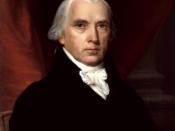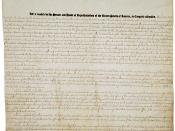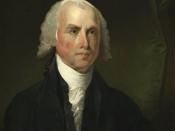With respect to the federal Constitution, the Democratic-Republicans were usually characterized as strict constructionists who were opposed to the broad constructionism of the Federalists. As history dictates, this is substantially accurate. In the time frame of 1801-1817, Thomas Jefferson and James Madison, the Republican presidents of the time, demonstrated the differences of the Republican Party in several aspects involving the interpretation of the Constitution. The Democratic-Republicans believed that the government should follow a strict interpretation of the Constitution and held the idea that this would allow honest representation of the people and prevent government corruption. However, the Federalists were firm believers in the production of a strong central government and a broad interpretation of the Constitution.
John Adams differed in the interpretation of the Constitution from the Democratic-Republicans in his Alien and Sedition Acts. Republican leaders were convinced that these acts were unconstitutional, but the process of deciding on the constitutionality of federal laws was not yet established.
As Washington continued to move closer to Alexander Hamilton's vision of a strong, central government which promoted commercial and financial interests over states' interests, Madison broke from Washington. As a result, he joined Jefferson to form the opposing party of Democratic-Republicans. During John Adams's presidency, Madison and Jefferson led the Republican fight against the Alien and Sedition Acts, which attempted to quell Republican opposition to Federalist foreign policy toward France. They proposed the "compact theory" of John Lock be applied in the Virginia and Kentucky Resolutions, which would introduce the theory of "nullification."
Thomas Jefferson and his Republican followers envisioned a society in vivid contrast to that of the Federalists. They dreamt of a nation of independent farmers living under a central government that exercised a minimum of control over their lives and served merely to protect their individual liberties granted by...



Nice
I like your paper!
2 out of 2 people found this comment useful.